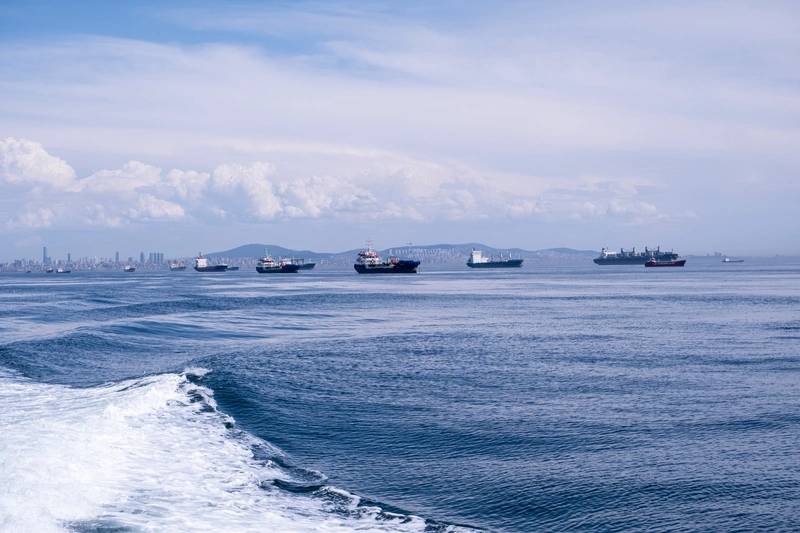Smart Sanctions: West Targets P&I Clubs to Limit Russian Shipping
The European Union and the United States are now targeting maritime protection and indemnity (P&I) insurance clubs to limit Russian shipping capacity and cap the price of its oil, meaning we’re finally beginning to see some smart sanctions for a stupid war.
P&I clubs are maritime insurance groups that specialize in open-ended, large-risk claims. P&I insurance is a requirement for all heavy cargo and container vessels. Under the new sanctions, European P&I clubs can no longer offer insurance to a vessel carrying Russian oil at a price higher than $60 a barrel.

Since February 2022, governments and the private sector have been imposing piecemeal sanctions against Moscow, including taking aim at the luxury items of oligarchs and Russian President Vladimir Putin’s inner circle. Yachts and jets were highly symbolic, but sanctions against them weren’t really useful.
Russia then lost access to the global SWIFT payment system. Only after some trade deals with India and China did Russia’s currency somewhat stabilize.
Then targeted sanctions were imposed on Russian companies and individuals. Roughly 537 firms, 276 legal entities, 1,637 organizations and 3,369 people faced some sort of coercive economic measure between February 2022 and June 2022.
Going easy on shipping capacity
Only 113 of 3,300 Russian maritime vessels, however, were subject to official sanctions.
Going easy on Russia’s maritime capacity was a blunder for U.S. President Joe Biden’s administration and its European counterparts. Ships can smuggle all sorts of trouble, even amid legitimate cargo.
For example, bananas are locally sourced from cocaine-producing countries, and since the fruit expires quickly, customs officials want to move shipments through borders as fast as possible. Eight tonnes of cocaine worth over US$207 million was recently discovered in a banana shipment to Belgium.
If Russia needs something illicit for its war in Ukraine, it likely arrives by sea.
With coercive economic measures on only three per cent of Russia’s entire merchant fleet in the first months of the war, these sanctions were sloppy at best and harmful at worst.
Within days of sanctions being imposed on those 113 Russian-flagged vessels, 18 of them switched to “flags of convenience” by registering the ships in the Marshall Islands and St. Kitts.
This is nothing new for merchant fleets. Ship owners regularly register their vessels in countries that charge little tax and overlook poor labour conditions in exchange for payments to register a vessel under their flag.
This is why countries like Panama, Liberia and the Marshall Islands ship so much more cargo than countries like the United States and Canada. Most of the world’s cargo and crude are shipped under flags of convenience, making targeted sanctions on national vessels difficult and often futile.
Into the shipping shadows
The direct sanctions against a small number of Russian vessels just encouraged nationally flagged ships to go deeper into the shadows and join their buddies under flags of convenience. Should sanctions be levied at Liberia and the Marshall Islands?
Doing so would put the brakes on hundreds of millions of tonnes of seaborne cargo. The global economy couldn’t handle that, and it would require enormous scrutiny to enforce these measures on guilty vessels.
This is why the latest round of sanctions targeting maritime protection and indemnity insurance companies is clever.
P&I insurance is required for every ship to enter ports to offload goods. The insurance covers the worst calamities, such as loss of life, dock damage and oil spills.
The insured vessel pays into the risk-pooling clubs that can move hundreds of millions of dollars quickly to any country in order to cover the costs of the disaster. Thanks to modern tech, steady tug boats and good harbour pilots, claims on P&I pools are low.
Still, every ship must have it, and the insurance entails massive, collective pots of money. If a sanctioned vessel is in the club, everyone in the club is at risk.
The clubs can also identify disingenuous vessels that might be hiding in their ranks. Data showing the history of flagging and ownership of any vessel is widely available. This allows the clubs to eject the questionable vessel immediately.
Past success
In 2012, the EU denied P&I insurance to Iran, effectively halting global Iranian energy exports within hours.
In 2017, I published research that pointed out that Kim Jong-un was acquiring nearly all of his most troublesome goods by sea, and recommended targeted sanctions against P&I clubs with North Korean vessels in their ranks.
Within days of the U.S. and EU imposing such sanctions, North Korea’s activities ground to halt. The regime wound up engaging in high-risk, low-reward sea-to-sea transfers to try to make ends meet.
Now that similar sanctions are in effect against Russia, all 3,300 known Russian ships are grinding to a halt. Some are jamming up traffic around Turkey’s Bosporus Strait and floating idly around Russia’s port city of Vladivostok.
Putin is scrambling to purchase a “shadow fleet” of about 100 vintage end-of-life tankers to try to get Russian oil to market. That won’t be enough to carry the Russian economy, but it could expose inroads to smuggling markets involving ports that overlook P&I insurance.
Keeping the $60 price cap on Russian oil is risky. Tempting Putin to sell oil under $60 will encourage oil smuggling in the shadows. A full P&I ban on all vessels thought to be Russian, however, would be devastating to Moscow.
Just like how tax evasion brought down Al Capone, it may be this insurance requirement that delivers a crushing economic blow to Putin.
It illustrates why governments and the private sector need to think smarter about sanctions. Don’t sanction the target. Sanction the environment in which they operate.
The author
Robert Huish, Associate Professor in International Development Studies, Dalhousie University
(Source: The Conversation)
